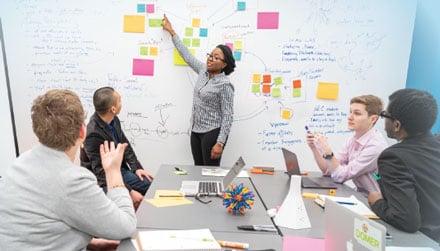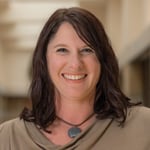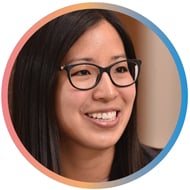2022 Charting a Career Path in Global Affairs
THIS GUIDE IS NO LONGER ACTIVE. For the current FP Guide, click here.
University of Notre Dame, Keough School of Global Affairs
At the Integration Lab, Practical Experience Is a Must
 The Keough School of Global Affairs was the first new school created at the University of Notre Dame in almost 100 years when it opened in 2014 and welcomed its inaugural class three years later. This presented an opportunity to do things differently.
The Keough School of Global Affairs was the first new school created at the University of Notre Dame in almost 100 years when it opened in 2014 and welcomed its inaugural class three years later. This presented an opportunity to do things differently.
Founded to provide solutions to timeless global threats such as poverty and disease, the Keough School draws upon nine institutes that focus on disciplines ranging from religion to international business. One unifying thread is the school’s Integration Lab, which gathers students from different disciplines to spend a year working with global organizations on real-world problems.
“No problem in the world is ever going to be solved by looking through a single disciplinary lens,” says Tracy Kijewski-Correa, co-director of the Integration Lab (i-Lab). “That’s the big problem with higher education. We put everyone in a silo by discipline. The Keough School is different. It’s a nexus.”
The i-Lab is different, too. Rather than writing a thesis, students pursuing a two-year Master of Global Affairs degree can spend a year in a team-based consulting role, completing a project—which includes deliverables—for organizations such as Oxfam and Catholic Relief Services.

“We bias toward action. We learn by doing. Instead of talking about a problem, we have to execute a strategy to make a meaningful contribution. All our i-Lab teams learn through active practice.” –Tracy Kijewski-Correa, Co-Director, Integration Lab, Keough School of Global Affairs, University of Notre Dame
The Integration Lab puts students into cross-cultural and cross-disciplinary teams of three and four that work directly for an organization, under faculty supervision. Projects are designed to tackle an objective or solve a problem and often involve data collection and fieldwork outside the United States.
“It is what students will be doing in life,” Kijewski-Correa says. “They won’t be writing the 20-page thesis. They’ll be writing highly impactful policy or programmatic deliverables.”
The experience comes at a real-world pace. For example, a three-person team charged with creating a system to better evaluate and serve the needs of refugees found their plans halted when COVID-19 stopped global travel. Within a week, the team transitioned to a virtual system and recruited refugees living in camps in Uganda and Myanmar to collect data using smartphones.
It was a strong lesson in flexibility and perseverance. “They built those emotional and mental muscles it takes to handle setbacks and pivots and the stress it creates,” Kijewski-Correa says.
The solution also empowered locals, exemplifying the i-Lab’s focus on helping the world’s most vulnerable populations. “We recognize that the most vulnerable often have little voice at the table,” Kijewski-Correa says. “We wanted to design a curricular experience that is very human-centered.”
 Building a Real-World Tool Helped Start a Career
Building a Real-World Tool Helped Start a Career
When Jenna Ahn McGuire entered the Keough School, she found far more than classes. Through the school’s Integration Lab, she joined a team that was developing an assessment tool to better understand markets in human shelter, working for the Terwilliger Center for Innovation in Shelter at Habitat for Humanity International. The tool is still in use by professionals today, and McGuire now works for Catholic Relief Services.
>>>“Joining Catholic Relief Services after the Keough School has been a natural fit, since at the heart of both institutions is a commitment to integral human development,” McGuire says. “What helped my transition was learning from so many experienced development professionals at the Keough School, where I was exposed to everything from proposal writing to monitoring and evaluation.
Contact
https://keough.nd.edu
[email protected]
574-631-3426![]()
Contents
- 2022 Charting a Career Path in Global Affairs
- Johns Hopkins University School of Advanced International Studies
- George Mason University, Schar School of Policy and Government
- University of Notre Dame, Keough School of Global Affairs
- University of Miami, Master of Arts in International Administration
- School of Diplomacy and International Relations at Seton Hall University
- Texas A&M University, The Bush School of Government & Public Service
- Clinton School of Public Service at the University of Arkansas
- Florida International University, Steven J. Green School of International & Public Affairs
- Princeton University, Princeton School of Public and International Affairs
- The Fletcher School, Tufts University